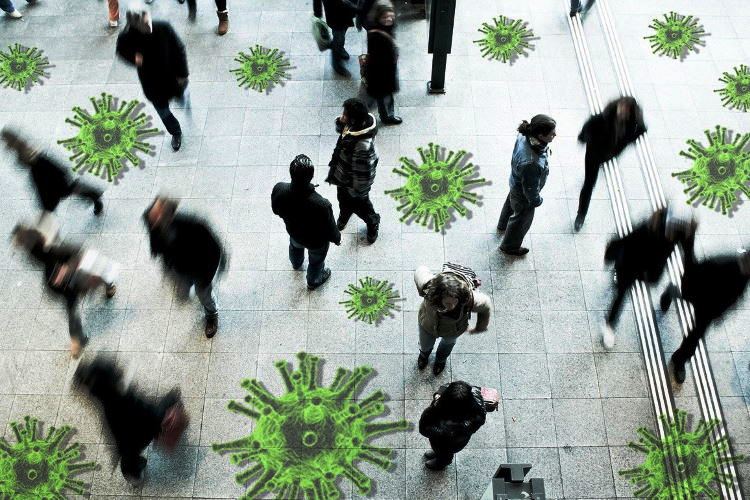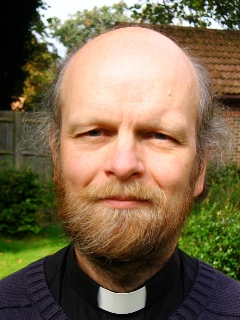A time for courage, not fear; love, not anxiety
25th May 2020

As the lockdown restrictions begin to ease, Andy Bryant, rgular Network Norfolk columnist, points out that we have an opportunity to rebuild society based on the values Jesus taught us
For two months the message has been clear: stay at home. But now thoughts are turning to the easing of the lockdown, although surveys report that many people are frightened and anxious about coming out of lockdown
Parents are resistant to the idea of schools reopening next week. Unions are expressing concerns over workers only returning when it is safe to do so. Everyone is wanting to avoid a new spike in virus numbers and, above all, everyone wants to avoid a second lockdown
This new virus is serious. The question is not its serious nature but what motivates our response. As a nation we have been remarkably compliant with the lockdown. Unusually, we have been willing to let the government tell us what to do. A key part in achieving such co-operation has been playing the ‘fear’ card
We needed to protect the NHS for fear it would be overwhelmed. We needed to save lives for fear of an out of control death rate. The creation of the Nightingale Hospitals and the creation of new mass mortuaries fed into this narrative. Be afraid, be very afraid; this thing could get out of hand
And we have all been taught to social distance. Suddenly the other person is seen as a potential risk. We have learnt to be alert to where others have been, the things they may have touched. The risk is all around us and the only safe place is in our home – although as the rise in domestic violence shows, home is not always a safe place
But if you have encouraged everyone to be afraid how do you encourage them to stop being afraid? How do you make it all feel safe again? Fear may have been a good way to gain compliance but turning that messaging around is much harder
There has been another narrative running alongside the fear. Courage. This has been focused on NHS Staff, Care Sector workers and Key Workers. In a time of fear, they had the courage to go out and make a difference. Whilst we were staying at home, they were risking their lives. And in their courage, they revealed their love for their fellow human beings
It is much easier for a government to talk about fear rather than love. It is easier for a Prime Minister to lead on a message that says: be afraid, this virus could get you and you might die. It is harder to imagine a Prime Minister saying that out of love for one another we need to socially distance
Fear plays to me and mine, it puts the focus on self and a desire for self-protection. It is about the individual and the private sphere. Love speaks to you and yours, it puts the emphasis on the other and a willingness for self-sacrifice. Love is about concern for the other and the bonds of community
Fear distorts love and reduces it to love of my family, my friends, the things that are important to me. Courage makes love grow, it is about reaching out, it is about both neighbour and stranger, it is about what is best for all, not just best for me. Fear says I will self-isolate because you might be a risk to me. Love says I will self-isolate as I do not wish to be a risk to you
Courage and love are not blind to risk. Rightly those on the front-line need PPE. It is in understanding and managing risk they are able to show their love and dedication. There are very real and present dangers. Fear sees how big they are and is paralysed by their enormity. Love sees them, seeks to understand them and then learns to manage them
It is love, not fear, we will need as we slowly (most likely very slowly) emerge from lockdown. If the motivation is about protecting me and mine, then the virus will have done lasting damage to the fabric of society. If the motivation is about how we do this together, for the benefit of all, then the virus can lead to strengthening the bonds of community
Step by step as we reengage with one another, carefully, sensibly we can reach out and help rebuild our communities. Businesses, shops, pubs, cafés, theatres cinemas, visitor attractions will need our custom. Charities will need our donations and the gift of our time through volunteering. If we hold back, fearful and anxious, then many others will be hurt and damaged by this experience and long into the future. If we step out in courage and love, then there is nothing that we cannot do and together we can forge communities where all can flourish
Again, and again in Scripture when people encounter God, or one of God’s messengers, they are told “Be not afraid”. God never wants to build relationships based on fear. God’s concern is to find ways to warm our hearts that we may reach out in love, to God and to one another. Jesus tells us to love God with our whole heart and our neighbours as ourselves. It is love that is the fulfilling of the law not fear. As St John reminds us: perfect love casts out fear
As we prepare for the next chapter in our response to Covid-19 we face a choice. Will our response be made in anxiety and fear? Or will we respond with courage and love? The society we will rebuild beyond this point will depend on the choice we make
image by Omni Matryx from Pixabay.com

Revd Andrew Bryant is the Canon for Mission and Pastoral Care at Norwich Cathedral. He was previously Team Rector of Portishead, Bristol, in the Diocese of Bath and Wells, and has served in parishes in the Guildford and Lichfield Dioceses, as well as working for twelve years with Kaleidoscope Theatre, a charity promoting integration through theatre for young adults with Down’s Syndrome
You can read Andrew's latest blog entry here and can follow him via his Twitter account @AndyBry3
The views carried here are those of the author, not of Network Yarmouth, and are intended to stimulate constructive and good-natured debate between website users
We welcome your thoughts and comments, posted below, upon the ideas expressed here
Click here to read our forum and comment posting guidelines
|